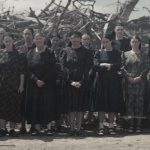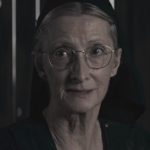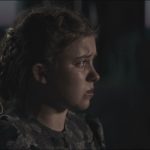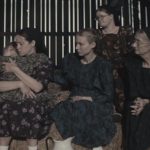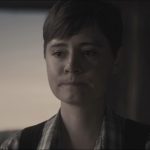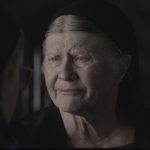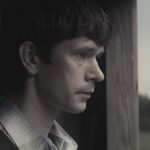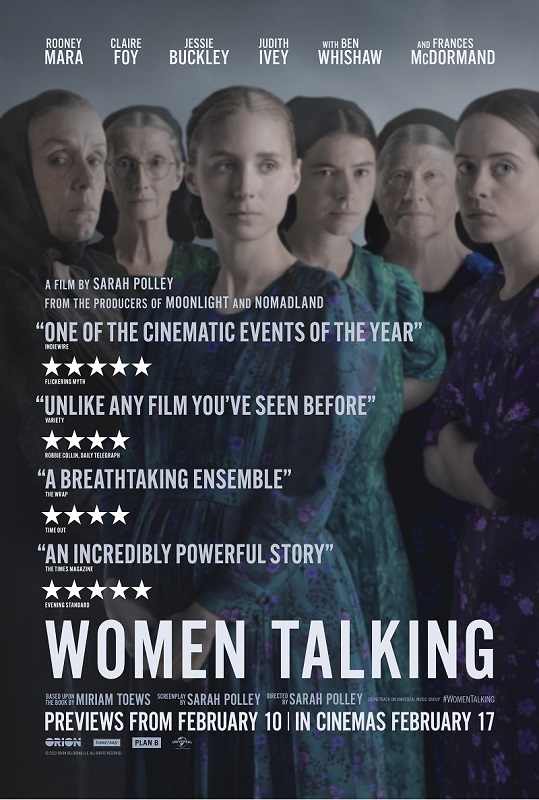

2022 – Women Talking
Well, this movie is about exactly what the title says. The entire movie only has one significant male character who even has any lines. The rest of the movie was a group of women gathered in a barn – talking. It brings up images in my mind of the 1957 film, 12 Angry Men. Now, what made the movie interesting was what they were talking about, of course. It was a horrifying subject that was made even more sickening because it was based on a true story. But I think that it was both this movie’s greatest strength, and at the same time, its biggest failing.
Now, what I mean by that statement is this: Having an intimate little story without much action, really allows the characters to be developed. The script was beautifully written. Each woman had a very distinct and believable personality. The dialogue and the interactions between the different characters was spot-on. But beyond that, it was just talking. The pacing was glacial, and ultimately, the movie was a little boring to my modern sensibilities. But I don’t see how else the story could have been told. The movie wasn’t really about the horror that the women were living in. It was about their reaction and response to that horror.
And what was that horror? Well, the story takes place in 2010 in a Mennonite community. They are a strongly religious people who make the practicing of their faith an active part of their every-day lives. But the community has a dirty little secret that it goes out of its way to hide. The men of the community regularly rape the women by sedating them with cow tranquilizer while they are sleeping, so that multiple attackers can sexually molest them on a regular basis. The women would just wake up every now and then with bloody sheets, knowing that they had been violated in the most horrific way. And to make it even worse, the abuse would sometimes begin with girls as young as eight years old.
In the beginning, a voice-over makes it clear that the men have been telling the abused women that it was nothing more than ghosts, and that they just had to accept what was happening to them. They would have to endure the pain and pregnancies without complaint. But one day when some men are caught in the act. They are arrested and taken to trial in a nearby city. As all the men in the community go to help post the bail, the women have two days to reach a decision.
They have three choices. They can do nothing and forgive their attackers. They can stay and fight, or they can refuse to forgive the men, and leave the community. This last choice, according to the men, has the added result of making the women unfit for the kingdom of Heaven. This is where the film actually begins, as the women meet in a barn to debate what they must do. They discuss the pros and cons of each choice and go into detail over the nature of forgiveness. They also talk about when forgiveness is appropriate, and when it is not.
And that’s about it. That’s about the whole movie. The women talk, and talk, and talk some more. And while the debates are sometimes spiritual, sometimes heated, and sometimes tearful, they bring the women to the most inevitable conclusion. They vote to leave, for their own safety, and the safety of their daughters. It was the right decision, but a hard one, knowing that they would likely never see their husbands or brothers again, and would go out into a world, woefully unprepared. It was made even worse because they were never allowed to go to school or learn to read. But in that situation, staying just wasn’t an option.
As you might imagine, the acting in this film was incredibly good. The actresses had a very good and dramatic script to work with. Though the film really had an ensemble cast, Rooney Mara arguably played the lead, Ona, a girl who has been impregnated by the rapes. Her sister Mariche is played by Jessie Buckley, and their mother, Greta, is played by Sheila McCarthy. Another woman is Salome, played by Claire Foy, who is angry enough to kill the men for their abuse, and to protect her little daughter from further harm. Her mother, Agata, is played by Judith Ivey. Michelle McLeod played Mejal, Greta’s niece. They all did a fine job, but I think that Shiela McCarthy and Judith Ivey both stood out as really great actresses.
And I have to mention the transgender man, Melvin, played by August Winter, who, after being raped, stopped pretending to be a woman, and stopped speaking to anyone but the children. And then there was the only significant male character, August, played by Ben Whishaw, a community teacher. He is asked to attend the meeting to take the minutes. He has romantic feelings for Ona. They both did a fine job, but their characters seemed almost unnecessary.
And Oh yeah, the ads made a big deal of Frances McDormand being in the movie, but I think she had a total amount of about three minutes of screen time in the entire film. She was great, but I wish there had been more of her. It was a good movie, but I think it would have been better if the pacing had been a bit faster. There was just so much talking, and not much else. I mean really. That was the whole movie. Women talking themselves into leaving their homes forever to protect themselves and their children. Powerful, yes, but slow.
